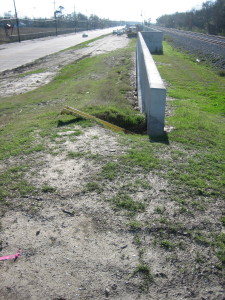Can You Lose the Right to Damages from a Nuisance if You Sell the Property Before Trial?
A recent opinion from the Court of Appeals address the issue of standing (“a party’s right to make a legal claim or seek judicial enforcement of a duty or right” according to Black’s). Division Two handed down its decision in Vance v. XXXL Development, Inc., involving a property owner’s nuisance claim against a developer. The developer had built a 25-foot high concrete block wall just two feet north of the homeowner’s property line. The homeowner sold her home prior to trial, and claimed that the sale price was $100,000 lower due to the nuisance. After the sale, the developer moved to dismiss the suit, claiming that the homeowner no longer had standing to sue.
 The developer relied on RCW 7.48.020, which provides that a nuisance action “may be brought by any person whose property is … injuriously affected or whose personal enjoyment is lessened by the nuisance.” Because the statute describes the damages in the present tense, the developer argued that the homeowner lost standing when she sold the home (ie, at the time of trial, she wasn’t one who is injuriously affected or whose enjoyment is lessened). The trial court agreed with the developer.
The developer relied on RCW 7.48.020, which provides that a nuisance action “may be brought by any person whose property is … injuriously affected or whose personal enjoyment is lessened by the nuisance.” Because the statute describes the damages in the present tense, the developer argued that the homeowner lost standing when she sold the home (ie, at the time of trial, she wasn’t one who is injuriously affected or whose enjoyment is lessened). The trial court agreed with the developer.
The homeowner argued that the statute was not meant to be read so narrowly. For example, RCW 7.48.180 allows recovery of damages even after a nuisance has been abated. Further, the homeowner pointed out that seemingly arbitrary outcomes could result: a homeowner who sold the day before trial cannot recover, but one who sells the day after trial can. Also, the tortfeasor would have an incentive to drag out litigation and intensify the nuisance, hoping that the homeowner would be forced to move due to the noxious nuisance before trial.
Division Two agreed with the homeowner’s arguments. It also noted that damages from the nuisance would be more definite if the property had been sold, and emphasized the rule that “the spirit or purpose of an enactment should prevail over express but inept wording.”
Although I agree that statutes generally should be interpreted to mean what they say, Division Two probably made the right decision in this case. The homeowner here appears to have been damaged, and the purpose of the nuisance statutes is not frustrated by allowing her to recover for the damages incurred when she did own the home. It also seems to be a stretch to argue, based solely on the use of the present tense, that the legislature intended to exclude as plaintiffs those who have sold their property after inception of the nuisance. The unanswered question (and there are not enough facts in the opinion to speculate) is whether the developer’s retaining wall actually constitutes a nuisance for which the homeowner should recover. But at least she has the right to argue her claim.
https://www.warealestatelawblog.com/can-you-lose-the-right-to-damages-from-a-nuisance-if-you-sell-the-property-before-trial/trackback/



COMMENTS (0)
Read through and enter the discussion with the form at the end